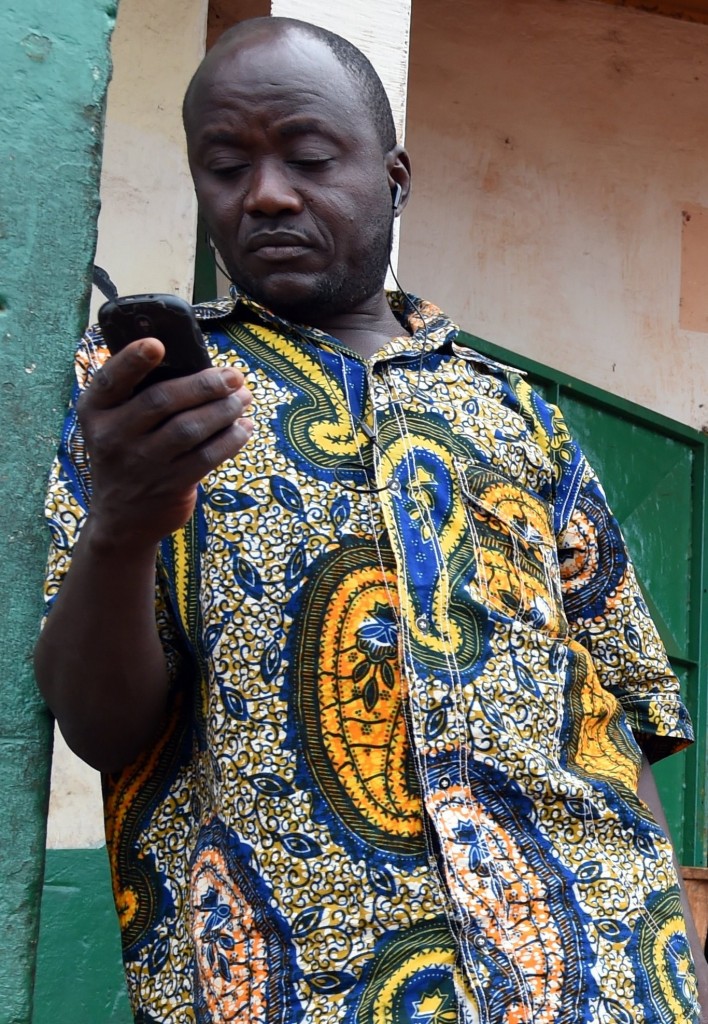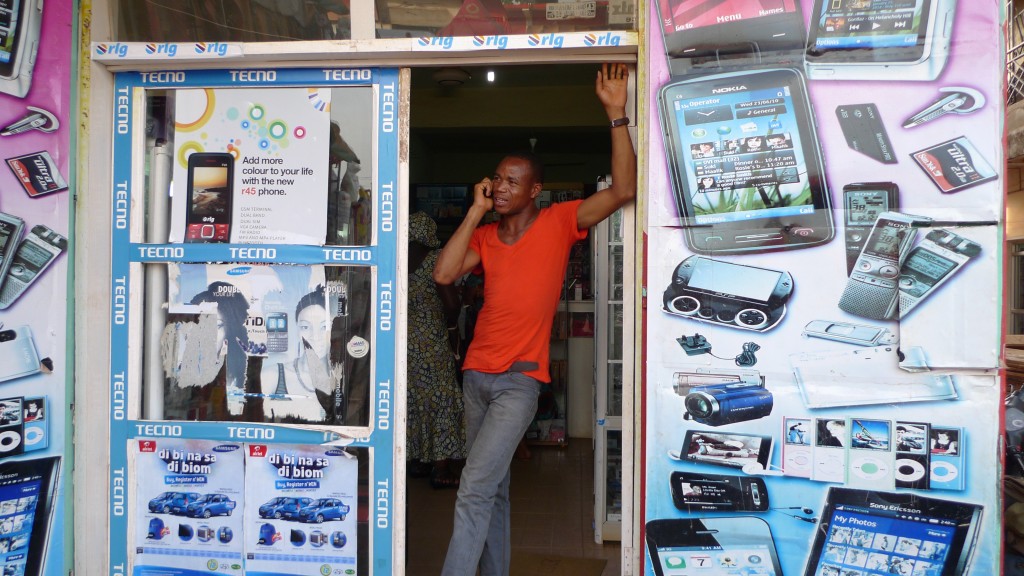The future of African media is mobile

ISSOUF SANOGO/AFP/Getty Images
A mobile revolution is exploding throughout Africa, giving a new generation of Africans access to mobile phones and mobile internet. This creates significant challenges, as well as opportunities, for media companies in Africa who need to find innovative ways to attract new readers and new revenue streams. onMedia’s Steffen Leidel talks with Justin Arenstein from the African Media Initiative about how mobiles are changing Africa’s media landscape.
What does the media landscape in Africa look like at the moment?
In Africa, you actually have two very different continents. You have the coastal continent which is connected to the outside world through undersea cables, so you get fairly good mobile and internet connectivity. Then you have a hinterland where there is no electricity and no connectivity at all. This means radio is still very dominant. Print is also still healthy and growing because only about 10 to 15 percent of the population have ever been print consumers. With Africa’s growing affluence, people have now starting to have disposable income. It’s a very small amount and on a very small basis but suddenly consumers can expand their lifestyles as well as their knowledge aspirations. Then they become new media consumers. The reality is that the media understand they are going to face the same disruptions and shift in audiences currently seen in America and Europe. But the disruption is not going to be internet driven, it’s going to be mobile driven.
Why mobile driven?
In a continent of a billion people, there are 800 million sim cards. Obviously, there aren’t this many cell phones because people have multiple sim cards, but there is a growing uptake of mobile. Handset costs are also coming down. So the media are working very aggressively to prepare themselves for this kind of shift. And unlike in Europe and in the US, the industry itself is working in a coordinated fashion. They have realized that you need to have the backbone infrastructure, that you need to have a widespread uptake of such platforms. If you think of the industrial revolution, which was powered by railways, we are building digital railways across the African continent because in large parts of it they don’t exist.
How is media innovation in Africa different to innovation in Europe or the US?
One small difference in that with innovation in the global North, you are fighting against inertia – you are fighting against an audience already using technology that more or less works. As a result, it is much harder to get people to change. In Africa, people literally go from radio to an Android tablet and that is their first engagement ever with the internet. In the same way, their first engagement with banking is mobile banking – they have never been to a bank building and stood in a queue. This means there are many more early adopters. If you have a good product, people are more likely to use it. In Europe, you’re fighting a lot of clutter.

More than eight in ten Africans have a mobile phone, and demand for mobile internet access is booming
Who will be the media players of the future?
Classical media will always be a part of the landscape but we are also seeing the emergence of mobile carriers. They originally partnered with media organizations to drive traffic and to share content on a co-branded service with a shared revenue model. Then they recognized that journalism isn’t rocket science and that journalists are incredibly poorly paid. So now they’re building their own newsrooms in places like Uganda and are becoming direct competitors.
Are there concerns about a decline in ethics if corporate organizations become news organizations?
One of the dangers it that lot of these new players don’t have a long history of journalism as a craft. Because of the fleeting nature of a lot of these new media organizations, they don’t develop an institutional culture. Now that is said with a caveat, because a lot of African media companies lack this deep media tradition as well.
Are there sustainable business models for media players trying out innovative products?
It is estimated that 85 percent of the Kenyan population now use the mobile payment system M-PESA in one form or another (“pesa” means “money” in Swahili). And M-PESA is easy to build into media products and allows for micropayment solutions in order to access certain content. Because people are very attuned to paying on a mobile, there is no resistance to making a micropayment for content they need. The flip side is that people will only pay for what is valuable and unique; they won’t pay for poorly developed content.
There are other kinds of revenue models, too. The Star in Kenya has developed products that run alongside its health reporting. For example, they run a story about fake doctors in Nairobi. If you want to find out if your doctor is fake, you pay a premium sms rate to find out if your doctor is legitimate. It’s a product that contextualizes, personalizes and localizes this big news story. But to do that, to make the story personal, readers have to pay a small premium. In order for media organizations to create revenue they have to massively increase their volume because the payments are only micropayments. That’s driving the media to expand because they currently have very small markets. If you look at the average size of a newspaper in Africa, very large papers are selling only 50,000 to 60,000 copies. So the flip-side is that digital technologies are forcing the media to expand into untapped rural markets.
Corporations such as Google and Facebook says they want to improve connectivity in Africa (read more about Google and Facebook’s plans). And then, in many places around the world, mobile operators allow their customers free access to Facebook but make them pay to surf other parts of the internet. Are people concerned about commercial enterprises controlling the internet on the continent?
I think it is something that you can’t worry about if you don’t have internet access. First get internet into people’s lives and than start talking about whether you want net neutrality or not. We are speaking about communities that don’t have electricity, don’t have schools or access to universities. These are people who otherwise have no way of communicating with someone living 50km down the road. There are no postal services. So access to free Facebook is a revolution. Why? Because they are not paying for the data they use and they can use Facebook messenger to communicate with family or friends or find other kinds of information resources anywhere else in the world. Yes, it is a walled garden in the sense that the user’s access to the internet is restricted. But the first fight is getting them online, then we start fighting about what that means and how to tear down the walls.
What advice do you have for training organizations about how African journalists can keep up with the digital transformation.
Not to treat it as being about the internet or digital content. The approach should be platform agnostic. Otherwise you’re just setting people up for the next disruption or the next change. Rather, you should set them up to deal with an evolving future where content is key and can go on any platform. Technology is not key because there will always be technicians available and newsrooms and news editors who will be able to repackage content as long as we can give them structured data content. The how, why, what, where of a story – they are all data points. And we now need to start breaking down the content so a story can be machine reformatted for a mobile screen, for a long-form story or for an infographic in as cost-effective a way as possible. Again, it’s not easy. Currently only some of the big players, such as the New York Times, can do it. We need to find cost-effective ways of doing this and to develop workflows.
This interview has been edited for clarity and length.
 A former journalist, Justin Arenstein is now a Knight International Journalism Fellow working on a digital innovation program at the African Media Initiative – an umbrella organization of African media owners and executives. The idea of the program is to develop strategies and resources to help African media leapfrog the disruption caused by the growing digital penetration of local audiences and media markets. Projects include seeking ways to digitize newsroom archival material, to creating a network of newsroom innovators and creating reusable API technology.
A former journalist, Justin Arenstein is now a Knight International Journalism Fellow working on a digital innovation program at the African Media Initiative – an umbrella organization of African media owners and executives. The idea of the program is to develop strategies and resources to help African media leapfrog the disruption caused by the growing digital penetration of local audiences and media markets. Projects include seeking ways to digitize newsroom archival material, to creating a network of newsroom innovators and creating reusable API technology.
Steffen Leidel talked to Justin Arenstein on the sidelines of the International Journalism Festival in Perugia, Italy, where Arenstein was part of a panel discussion on the future of African media. You can watch the panel discussion below.
onMedia has previously talked to Justin Arenstein about the hacks and hackers trend in Africa.



